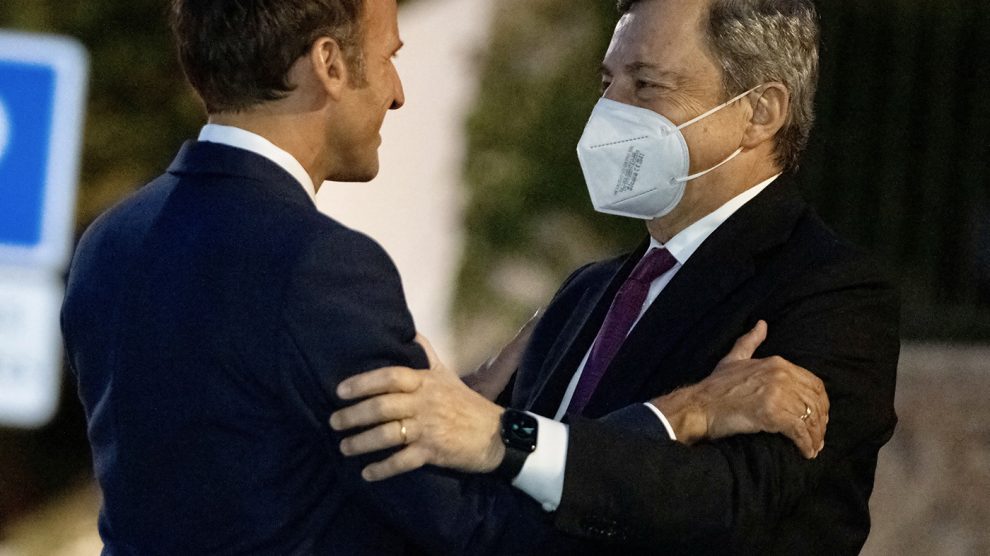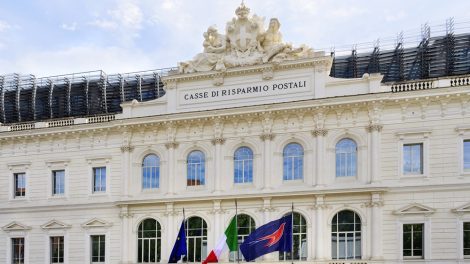For Italy, the decision to follow France in its crusade against AUKUS – the anti-Chinese military pact between the United States, Australia and the United Kingdom in the Indo-Pacific – may ultimately backfire.
There are two ways to see the issue that caused a diplomatic uproar, driving French President Emmanuel Macron to recall his ambassadors to Washington and Canberra.
On one hand is the French and European disappointment due to the lack of consultations between the US and its European allies over a choice with significant strategic repercussions, not unlike the withdrawal from Afghanistan.
On the other hand, the EU, NATO and Italy have nothing to do with the issue, which ultimately is an entirely French industrial match.
The Elysée is furious with the Australian government because AUKUS spells the end of a €31 billion tender, won by France in 2016, to supply Australia with 12 Shortfin Barracuda Block 1A submarines.
Those are diesel-powered subs, less technologically advanced (and much less frightening) than the nuclear-powered ones at the centre of the AUKUS alliance, which US President Joe Biden intends to wield to scare China in the Indo-Pacific region.
What Mr Macron does not let on, is that the deal was already sinking by itself. As testified for years by dozens of local Australian newspapers, the pact between Paris and Canberra was rife with cracks: a seriously overdue roadmap, soaring costs (from €31 to €56 billions), unfulfilled promises. Above all, the French promise of setting up a real national industry in Australia – beginning with the shipyards in Adelaide – was disattended.
Paris initially estimated that the deal would hinge on a 90% local input, sustaining 2,800 local jobs, but in 2020 the figure was revised downwards to 60%. On the Australian side, patience had reached its limit. If there ever was a “stab” to the French, rather than “in the back” – as Foreign Minister Jean-Yves Le Drian roared -, it was in the face.
To think that Paris’ industrial match ends here, however, would be a grave mistake. Behind the accusations hurled by Paris against NATO and the US, something is moving. And the incident may ultimately result in another chance for the French shipyard.
Firstly, the AUKUS pact hasn’t spelled the end of the Australian saga yet. It will take eighteen months of consultations and several years to assemble and ship the British submarines. Delivery times are long, too – perhaps too long for Australia.
The latter now finds itself having to deal with a furious China, which in turn boasts 12 nuclear-powered submarines, to say nothing of those under construction. Thus, France could swoop in through an “intermediate” order and fill that void, offering immediately-available vehicles while Canberra waits for the more advanced, AUKUS-branded subs.
Furthermore, the French will try to redeem their “debt” with the US. The AUKUS letdown, seen worldwide, allows Paris to make claims that would have been unthinkable if the case were limited to an exclusion due to market reasons (as indeed it was).
There is no shortage of opportunities to raise and bargain. Starting with the G20 and the next UN General Assembly, two forums where the Indo-Pacific pact will certainly be discussed.
Furthermore, the EU and US Trade and Technology Council (TTC) – the body that will dictate the rules of the game between transatlantic allies, from patents to the control of Big Tech – will begin on September 29th.
Then there is the EU-Australia Free Trade Agreement. After three years of tiring negotiations, the French want to blow up the process – and convince the EU to do the same.
Finally, consultations will open imminently to lay the first stone of the European common defence. That’s another industrial game with a massive question mark: will American companies participate? And if so, how many, and which ones? Meanwhile, Italy has already opened up to the idea, while France is hesitating and wants to set conditions.
So, how should Italy move? It is no mystery that part of Rome’s political sphere speaks better French than Italian. Some are already attempting to drag the government into a tug-of-war with the US, where the benefits are unclear but the damages are self-evident.
Those who know the Italian shipbuilding industry know how the business scales tilt much more towards Washington than towards Paris. An example: the leading role of the Italian shipbuilding giant Fincantieri, together with Lockheed Martin, in the US shipbuilding industry. The latest order, won by the former a year ago within the Fast Frigate program (FFGx), was worth $795 million.
France is trying everything to “Europeanise” the AUKUS-triggered political and industrial issue, which has always been bilateral, in an attempt to privatise profits and socialise losses.
At this point, Italian PM Mario Draghi – whose country weighs twice as much in the EU, due to the diplomatic void left by the departure of German Chancellor Angela Merkel – faces a crossroads. Openly siding with France, with the (real) risk of damaging his position while the French alone reap the result of a negotiation. Or offering to back Mr Biden, something that the latter needs more than ever.





